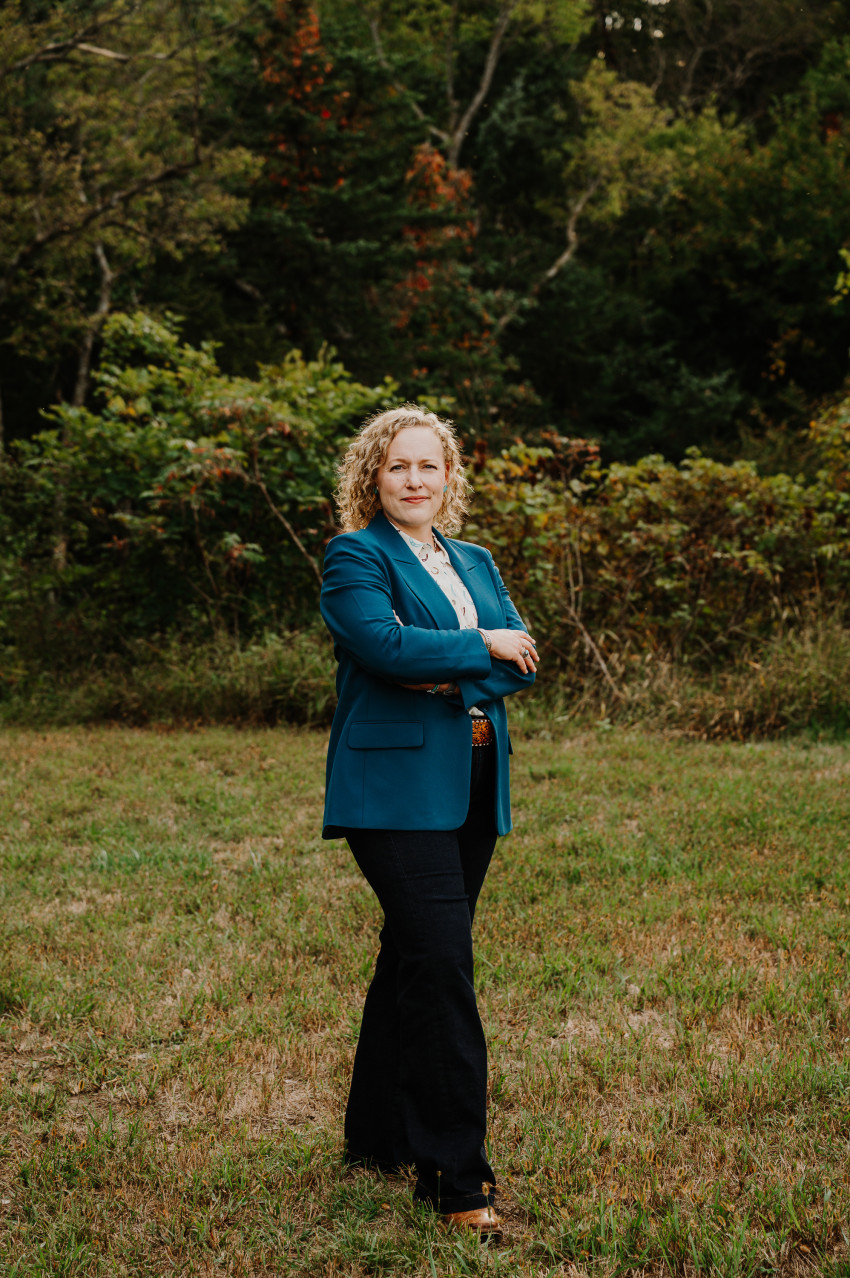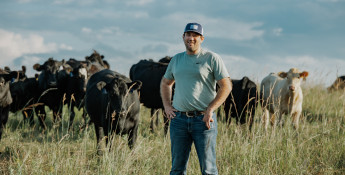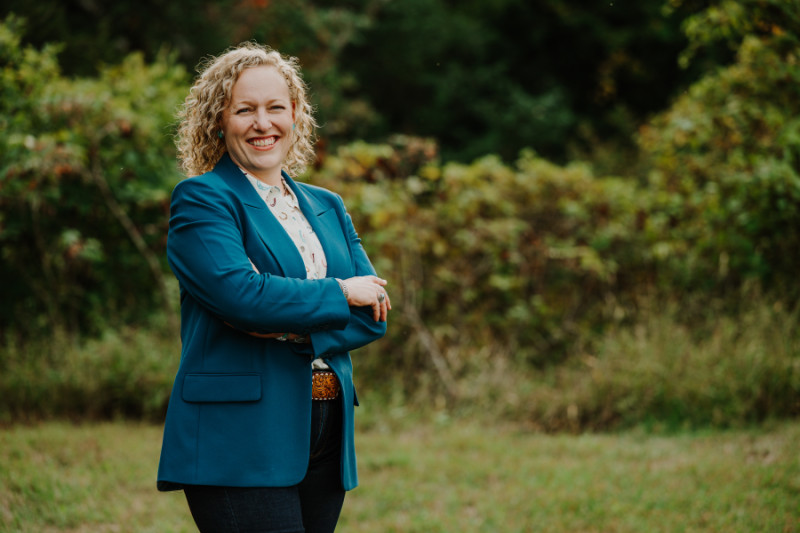By Sheridan Wimmer on October 17, 2025
HINK Executive Director Honored for Mental Health Advocacy in Agriculture
Sarah Gideon provides crucial mental health outreach and education for rural communities in Kansas
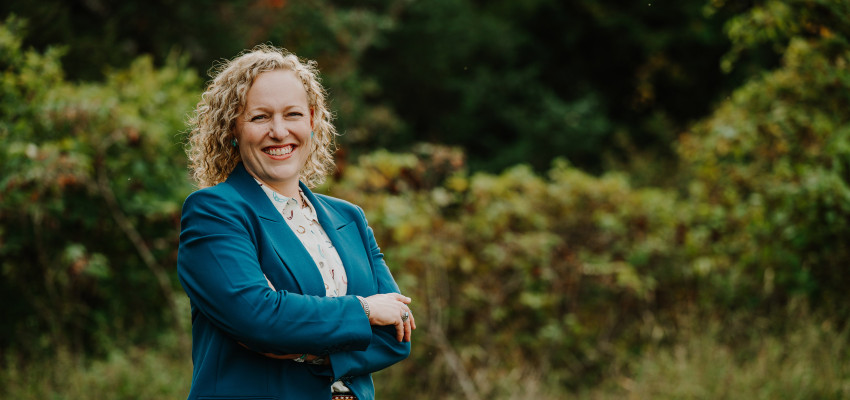
Rural healthcare is a vital component of a healthy state and country. The heartbeat of rural Kansas relies on rural hospitals to provide care to residents. Kansas has more rural hospitals gasping for air to stay open than any other state, according to the Center for Healthcare Quality and Patient Reform. Where there are closures, there are risks for our family, friends and neighbors to get the care they need. And that doesn’t only impact their physical wellbeing, but also their mental health.
Sarah Gideon, executive director of Health Innovations Network of Kansas (HINK), is focused on helping rural hospitals thrive, especially in the areas of mental wellness. Gideon has been named Kansas Farm Bureau’s 2025 Rural Minds Matter Advocate of the Year for her compassionate work to cultivate resilience among rural communities and bridge the connection between healthcare providers and agriculturists.
“Agriculture and healthcare are intertwined in everyday life, whether we realize it or not,” Gideon says. “We need food, fuel and fiber from agriculture — and we need doctors, nurses and hospitals to keep us healthy. Those two industries sustain each other.”
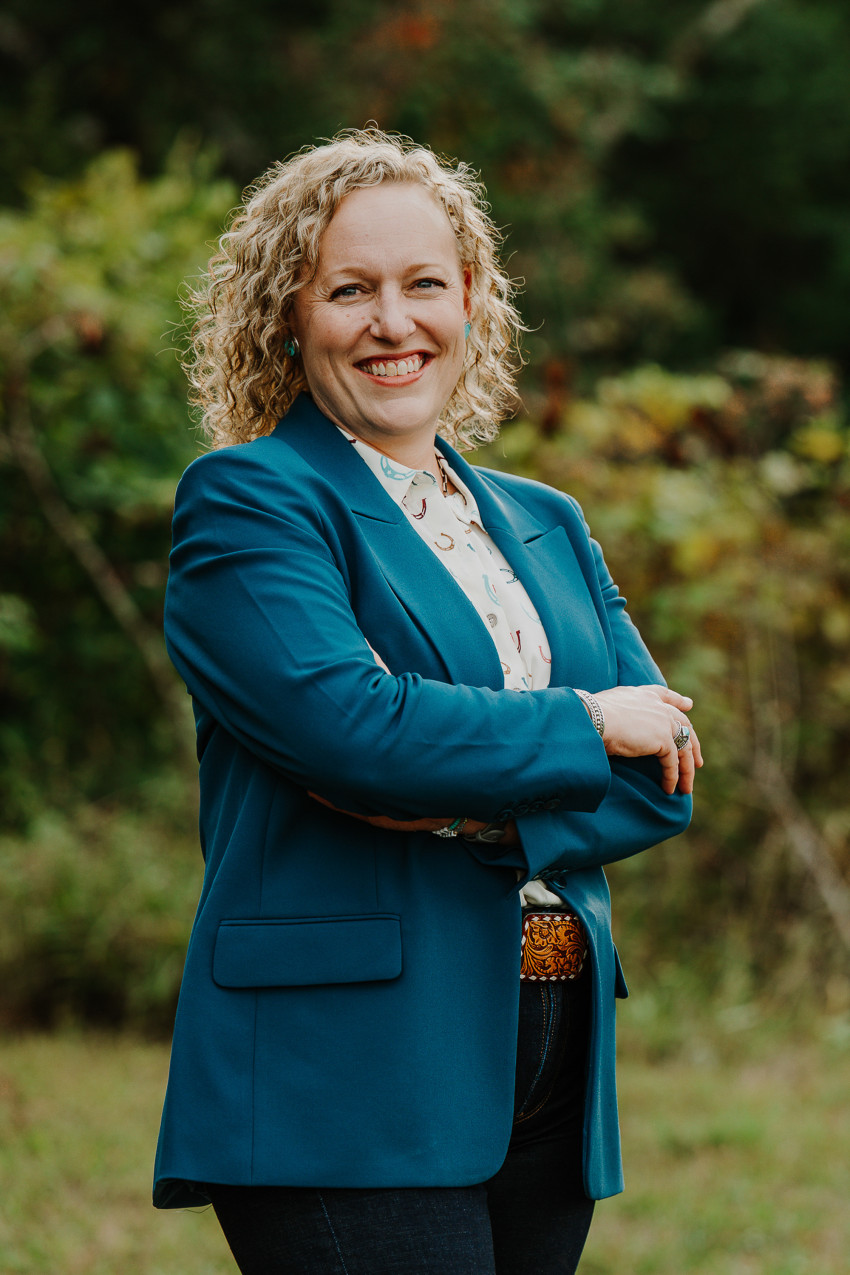 HINK is a network of 15 hospitals in northeast Kansas. From Abilene to Atchison and Highway 36 to Coffey County, the membership organization includes varying hospitals that include 12- to 14-bed critical access hospitals to a more than 300-bed tertiary facility in Topeka.
HINK is a network of 15 hospitals in northeast Kansas. From Abilene to Atchison and Highway 36 to Coffey County, the membership organization includes varying hospitals that include 12- to 14-bed critical access hospitals to a more than 300-bed tertiary facility in Topeka.
“Several of my hospitals, if you look out their front door or look out windows, you see corn fields and soybean fields,” Gideon says of the connection rural hospitals have with agriculture. “You're not far separated from the agriculture that is surrounding the communities, especially our rural communities and I just love that. I treasure the ability to take care of our neighbors and our friends.”
TURNING PAIN INTO PURPOSE
Gideon exemplifies the qualities people should have who work in healthcare — warm, inviting, smart and empathetic. She’s experienced the loss of loved ones to suicide — a weight she carries with grace, purpose and a mission.
“I lost my friend Lisa to suicide when we were 15,” she says. “Now that I look back, I realize what that experience really was and how hard life had to have been in that moment for her. That is my first remembered experience of the effects mental health can have on someone. Along the way, I’ve lost more friends in agriculture to suicide, and we continue to see our farmers and ranchers and their family members suffering from deep stress.”
Those stressors, Gideon points out gently, can lead to anxiety, depression and substance abuse.
“For some of them, their darkest day takes them to suicide,” she says.
Gideon’s hope is that through continued conversations to decrease stigma and listen to how our friends, neighbors, family and even strangers are doing, mental health is an easier topic to discuss openly.
“I’m not a clinician or a behavioral health provider, but one of the most important things we can do is talk to one another about our own mental health,” she says. “We can’t hide it in the shadows any longer or shun people for having those experiences.”
TWO VITAL INDUSTRIES, ONE SHARED MISSION
The two industries Gideon works for are vastly different in a lot of ways, but there are many similarities.
“Our urban neighbors might think their food comes from the grocery store — and for them, it does,” Gideon says. “But we see more closely where our food originates. The same is true for healthcare. We don’t think about our hospitals or clinics until we need them, yet both food and healthcare are essential, everyday needs.”
Just as healthcare and agriculture are both essential yet often overlooked, the challenges within each field can run deep — especially in rural communities. Healthcare workers and farmers and ranchers understand economic pressures and uncertain financial constraints. The farm crisis of the 80s is a grim reminder of the stressors farmers and ranchers face. The combination of high interest rates and low commodity prices caused economic hardships on farm families across the U.S. Suicide rates among farmers and ranchers increased dramatically during this time.
“Looking at the number of farmers and ranchers we lost during the 80s and the ag economy’s rise and fall over time, and as we look at the stressors that are unique to agriculture, we know it’s difficult for them to walk away from their stress,” Gideon says. “I walk out of my door and away from my business. Our friends who ranch walk out of their front door into their business. It’s integrated in every moment of their lives. I think about those things often and the impact they have that are different from some of our urban neighbors within our hospital network.”
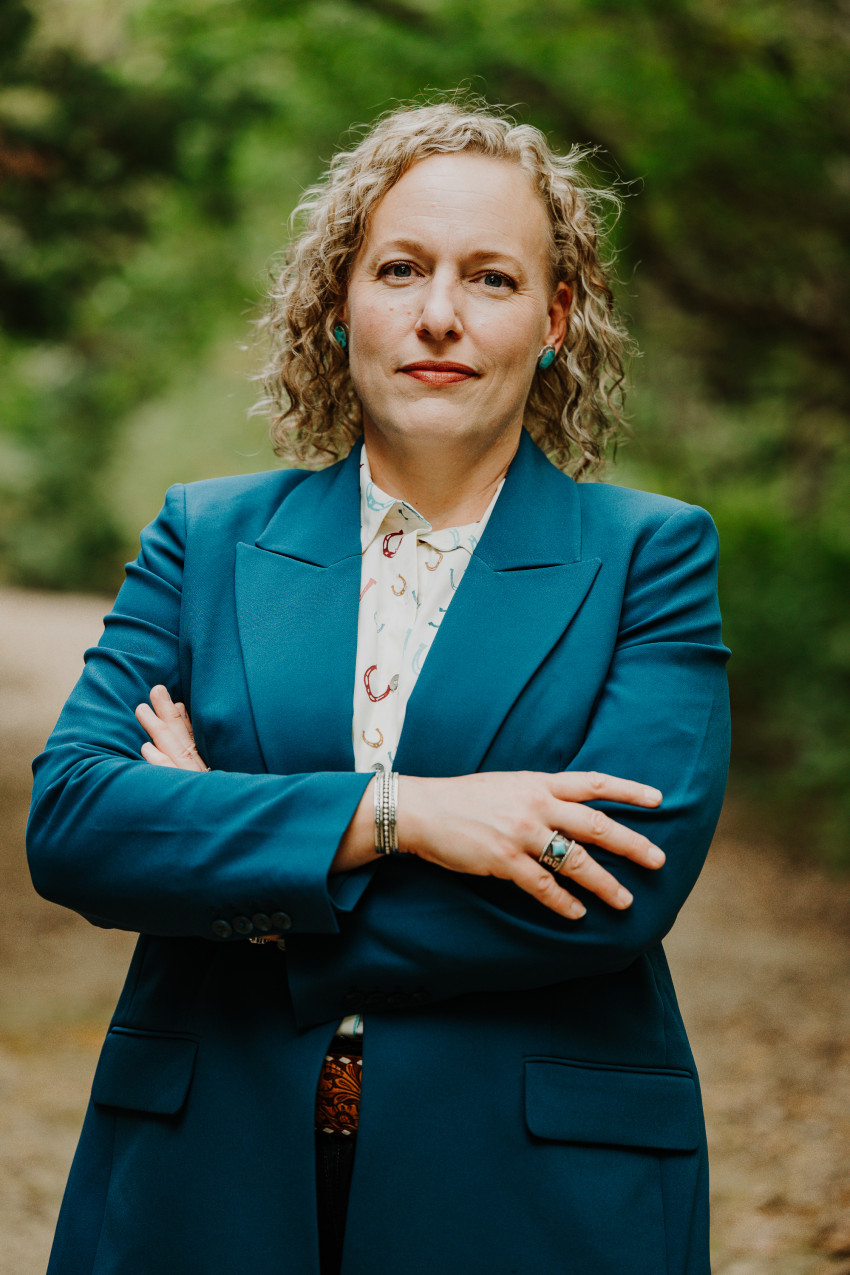 There is a direct correlation between farmers and ranchers caring for themselves and having a healthy community. These individuals are committed to the safety and wellbeing of their animals and crops but sometimes fail to remember they’re the most important cog to keep healthy.
There is a direct correlation between farmers and ranchers caring for themselves and having a healthy community. These individuals are committed to the safety and wellbeing of their animals and crops but sometimes fail to remember they’re the most important cog to keep healthy.
“If our agricultural producers want their businesses to be healthy, they have to be healthy themselves,” Gideon says. “The wellbeing of our farmers and ranchers directly impacts the wellbeing of our communities. In health care, we talk about integrating behavioral health. That doesn’t just mean seeing your doctor for physical needs — it means having conversations about your stress levels, your sleep, your anxiety, your depression. Because all of those things are connected.”
The current agriculture climate is hard on many sectors of the industry. Gideon understands the dynamic in agriculture and the toll it can have on the people raising animals and growing crops.
“As cattle markets rise, it’s a great time to be a cattleman — but there are challenges in other sectors of agriculture,” she says. “I want our livestock market operators to think about how they’re looking out for their customers and communities, and how they can be leaders in talking about mental health.”
MENTAL HEALTH STARTS WITH COMMUNITY
According to the National Rural Health Association, farmers are 3.5 times more likely to die by suicide than the general population.
Looking out for one another starts close to home. From the local bank to the coffee shop, in church pews or our neighbors down gravel roads, healthy farms and ranches start with healthy farmers and ranchers – with community support.
In 2021, HINK received a Rural Health Network Development Planning Grant from the Federal Office of Rural Health Policy. That’s where the HINK Suicide Prevention Improvement Network (SPIN) began.
“We spent a year holding town halls, sending surveys and facilitating one-on-one interviews,” Gideon says of the work to create SPIN. “We started asking what challenges all our hospitals shared — large or small, urban or rural. When we looked at the data and community health needs assessments, one thing stood out across the board: mental health. SPIN is a collaboration of hospitals and ag organizations that meets monthly to share ideas and initiatives.”
Projects implemented by Gideon and her team at HINK are intended to spark conversation and raise awareness about mental health in everyday spaces. It may be something as simple as a coffee cup sleeve or a pamphlet in a co-op.
“We want to meet people where they are,” Gideon says. “That might mean a flyer in a library, a sticker on a cold drink, a table tent at a café or on a bill of sale from the co-op. Wherever folks in our communities are, that’s where the conversation needs to be.”
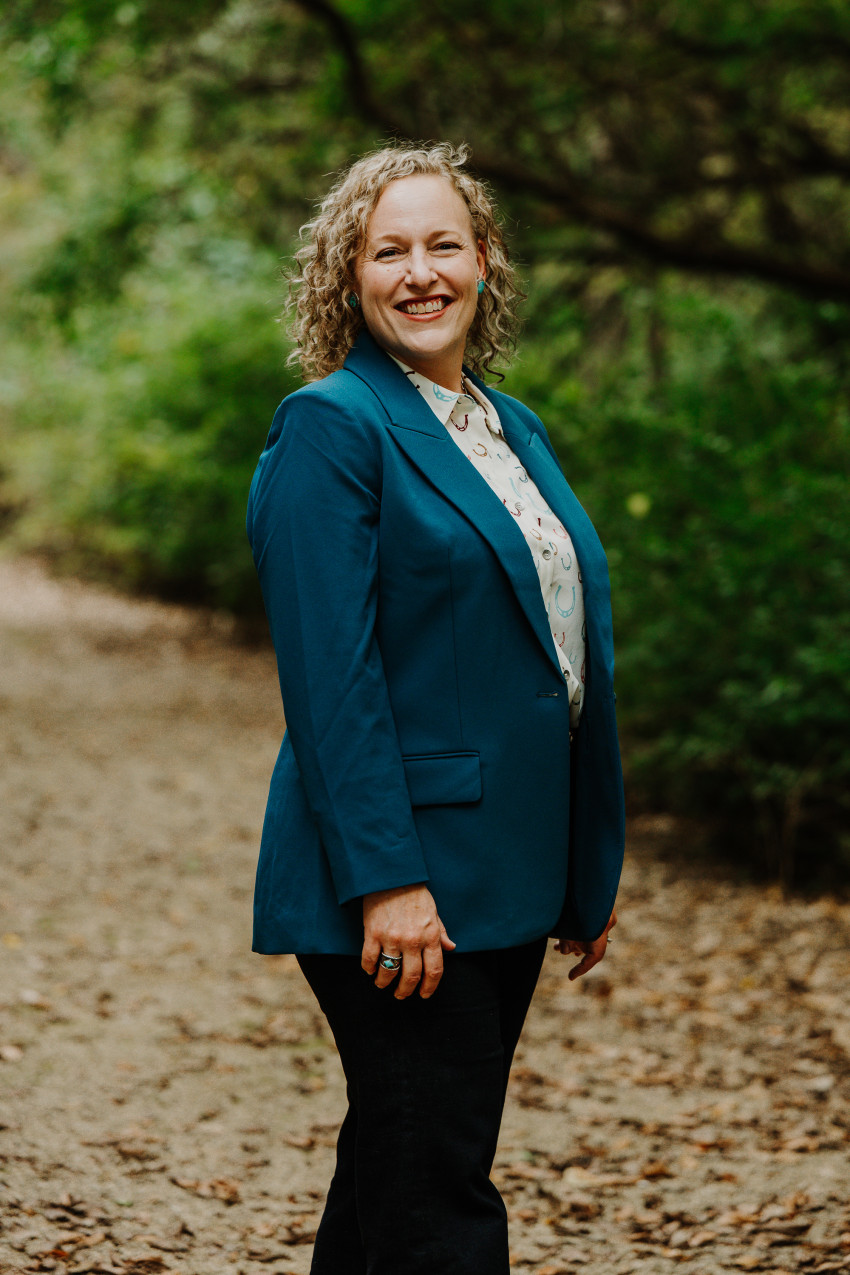 One of those projects is the Coffee Cup Project, where coffee sleeves have a QR code on them that goes to healthinnovationks.com and a thought-provoking statement like, “Perish the thoughts before they perish you.” It’s bold and makes an impact. HINK put these sleeves in coffee shops across northeast Kansas because sometimes the small reminders can make a big difference.
One of those projects is the Coffee Cup Project, where coffee sleeves have a QR code on them that goes to healthinnovationks.com and a thought-provoking statement like, “Perish the thoughts before they perish you.” It’s bold and makes an impact. HINK put these sleeves in coffee shops across northeast Kansas because sometimes the small reminders can make a big difference.
Gideon also partners with several agricultural groups to present training opportunities and presentations to further her impact.
“We sponsor speakers at ag-related conferences — from Women Growing the Farm to Commodity Classic in Salina — so producers, ag bankers, NRCS staff and others hear about mental health in the context of their own lives and work,” Gideon says. “This year I had the chance to speak to the Livestock Marketing Association’s annual conference in Omaha — a room full of market operators — and it was fantastic. We’ve stayed in touch, talking about ways they can support mental health in their sale barns and communities. It’s all about keeping the conversation going.”
STRESS IMPACTS US ALL
Gideon acknowledges her own dynamics with mental health; one aspect of being an advocate on a heavy subject is to be able to carry your own struggles and know how to manage them in your own way.
“There’s a lot of change in life right now,” Gideon says. “Change can push anyone’s stress levels, and I’m no different. Our nest just emptied — my daughter’s a freshman in college — so I’ve really tried to focus on the basics: good sleep, good nutrition, staying hydrated, getting outside in the sunshine and moving every day. Those are the things that help me stay steady.”
Gideon knows what works for her won’t work for all. When she can step outside and leave the stressors of her work life, farmers and ranchers can’t. But there are other ways to alleviate stress. They may sound simple, but finding mechanisms that work for you as an individual is an important aspect of recognizing and creating important boundaries to protect mental health.
“It’s easy to isolate when you’re stressed. I do it too,” she says. “But I’ve learned I have to reach out — call a friend from my book club, go for a walk with my walking partner, spend time with my family. The conversation doesn’t even have to be about what’s bothering me; it’s just about connection. Sometimes you have to get out of your own head.”
REWARDING EMPATHY
Gideon’s work to bridge physical healthcare with mental healthcare is worthwhile – after all, she’s helping protect our most valuable assets – our people. Her work to inspire others to reduce stigma surrounding mental health conversations while providing meaningful ways to be a part of the solution is why she was selected as the 2025 Rural Minds Matter Advocate of the Year.
“It’s thrilling to see the work we’ve been doing over the past few years start to take root,” she says. “Accepting this award is humbling — because to me, the work is what matters most. The recognition shines a light on the hospitals we represent, the ag organizations we partner with and the communities we serve. The award isn’t my personal accomplishment, rather it’s a reflection of the collective effort to build stronger rural mental health support.”
Gideon is the first to admit it’s hard to measure success in the work she does. There isn’t necessarily a quantitative way to measure if you saved someone’s life unless they share that experience.
“We’re probably never going to see data from the state that says, ‘Because of your work, you changed the trajectory in these 15 counties,’” Gideon says. “But when I go to conferences or speak at events and people come up to share their stories with me — about their challenges or about losing friends and family — that tells me there’s still a need. And it tells me people are starting to talk about it.”
The human experience is a full spectrum of emotion and experiences. Grief, joy, pain, exuberance – they all matter. Gideon hopes we’re able to share our stories of pain as easily as we share stories of success and accomplishments; and she’ll meet you where you are to listen.
If you or someone you know is experiencing a difficult time, please reach out to 988. For other resources and to learn more about mental health initiatives, visit www.kfb.org/ruralmindsmatter. Applications and nominations for the 2026 Rural Minds Matter Advocate of the Year Awards will open in May 2026 to honor Mental Health Month.

